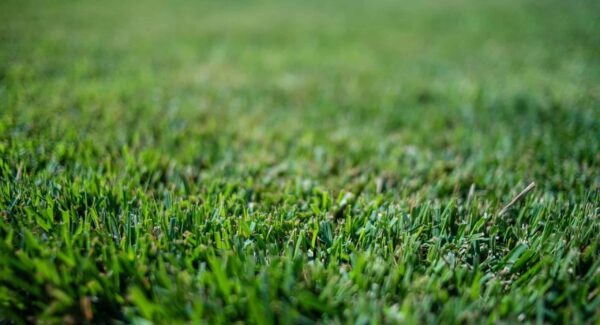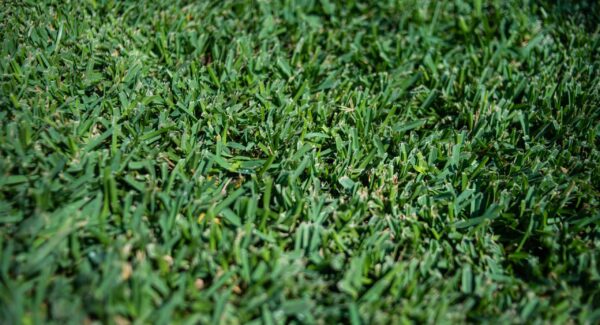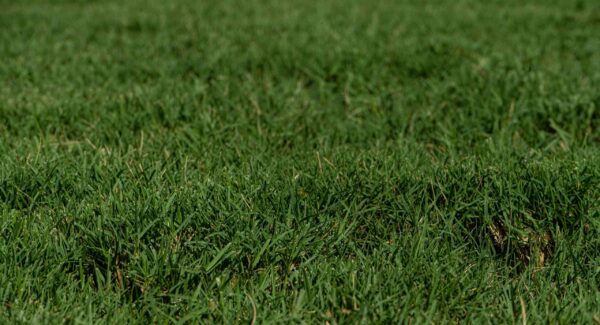2 Best Types of Grass for Soccer Fields: Celebration Bermuda and Tifway 419 Bermuda
When installing a soccer field, selecting the correct type of grass is one of the key elements that directly impacts the quality of the game, player safety, and the longevity of the field. Soccer fields endure immense pressure due to constant foot traffic and intense use, so the grass must be resilient, quick to recover, and easy to maintain.
Additionally, the turf must remain in top condition even during the most demanding weather conditions, including high temperatures, droughts, and rainy seasons when the field is prone to damage. Considering all these factors, choosing a grass that ensures field stability and uniformity, reduces injury risks, and provides optimal conditions for professional sporting events is essential.
Varieties like Celebration Bermuda and Tifway 419 Bermuda are highly valued when selecting grass for soccer fields. Celebration Bermuda is often chosen for its durability and ability to withstand heavy traffic. This variety is known for its quick recovery after damage, which is crucial for frequently used fields.
Tifway 419 Bermuda is a finer-textured variety with dense growth, providing a uniform and stable turf. Its wear resistance makes it an excellent choice for professional soccer fields, as it allows long-term use with minimal maintenance.
In this text, we will cover the following details:
- Why it is essential to choose the suitable grass for a soccer field
- The characteristics of Celebration Bermuda and Tifway 419 Bermuda
- The advantages of one over the other
- How to maintain soccer fields with Celebration Bermuda and Tifway 419 Bermuda grass
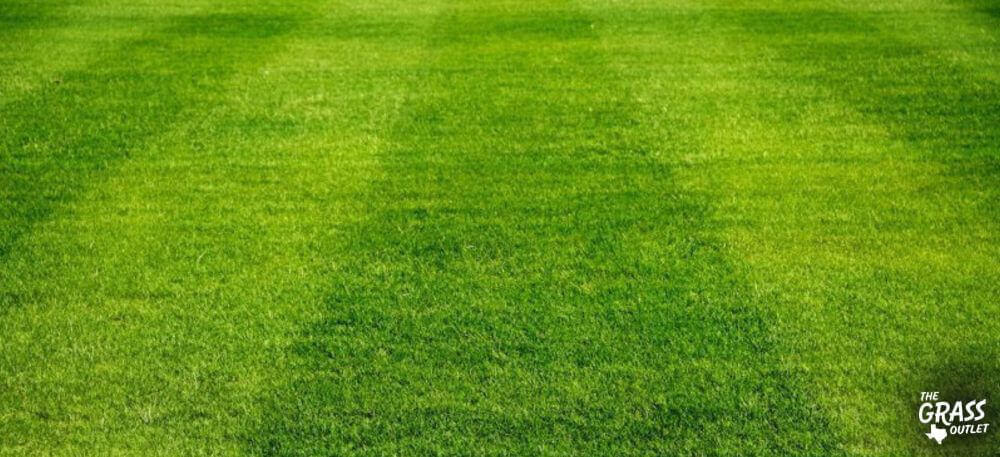
Why is it important to choose suitable grass for soccer fields?
Finding the best grass variety for sports fields depends on several factors, including location, frequency of use, and climatic conditions. Research and practical studies have shown that natural grass is safer than artificial (synthetic) turf. But what should be considered when selecting a specific type of grass?
Soccer fields are subjected to constant foot traffic and heavy wear, meaning the grass must resist abrasion while providing safe playing conditions. Continuous contact with cleats, friction, and frequent changes in running direction exert pressure on the surface. If the grass is unsuitable, it will quickly deteriorate and create uneven areas that can negatively impact the game.
One of the most critical aspects is the quick recovery of the grass after matches. Soccer fields are often used, and there is little time for recovery between games and training sessions. That’s why investing in grass that regenerates quickly, restores damaged areas, and returns to its original state is essential for maintaining consistently high field quality. Grass that responds soon to damage ensures that the field remains functional and safe, regardless of usage frequency.
The playing surface significantly influences athletes’ performance and safety. A high-quality turf reduces the risk of injury, provides better stability and ball control, and enhances the overall experience on the field. Properly selected grass provides optimal playing conditions, reduces slipperiness, and ensures a firm yet comfortable surface for running and movement.
Tifway 419 Bermuda – The Gold Standard for Sports Fields
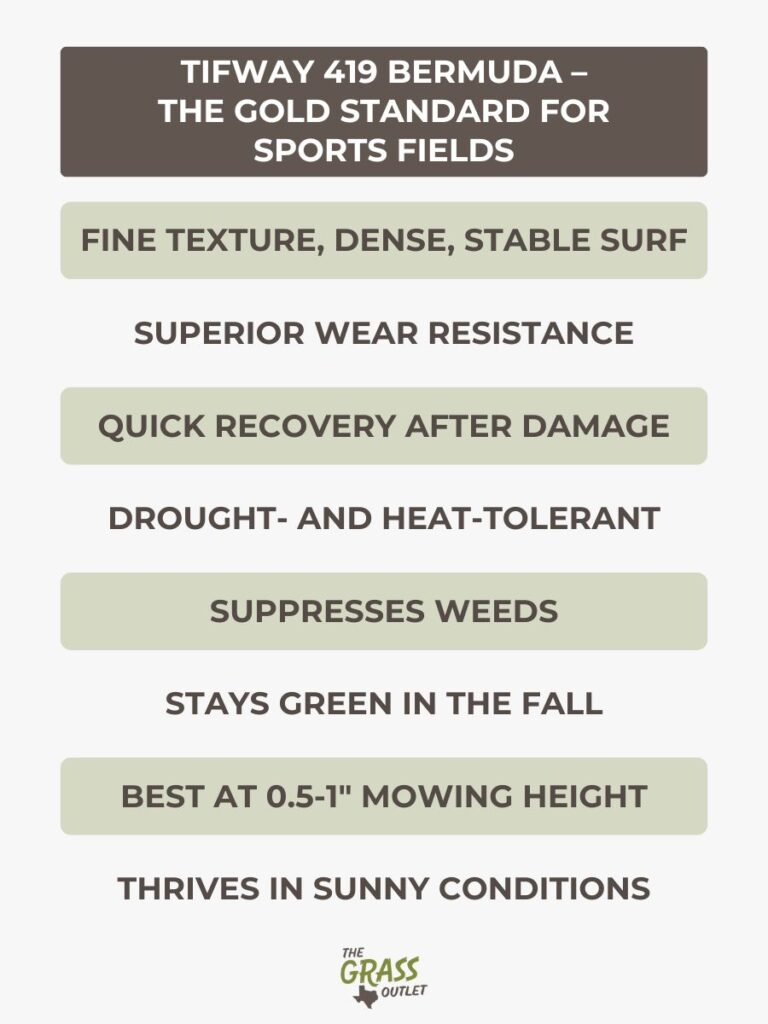
Tifway 419 Bermuda also recovers quickly after damage, keeping the field in consistently good and neat condition between matches. Another advantage is its excellent drought tolerance. In regions with extremely hot climates, where fields are frequently exposed to high temperatures and droughts, Tifway 419 Bermuda is a reliable solution due to its heat resistance.
This grass variety retains its green color well into fall and spring, enhancing the field’s aesthetics. Its ability to efficiently suppress weeds makes it even easier to maintain. The fine texture of Tifway 419 Bermuda’s blades results in a smooth playing surface, which improves precision, enhances ball control, and reduces the risk of injuries—crucial for professional athletes.
This grass can be mowed with both standard rotary and reel mowers. The recommended cutting height is between 0.5 and 1 inch, which is crucial for golf courses and other sports that require well-manicured grass. It’s also important to note that Tifway 419 Bermuda thrives best in areas with plenty of sunlight.
Celebration Bermuda: A Soccer Field Favorite
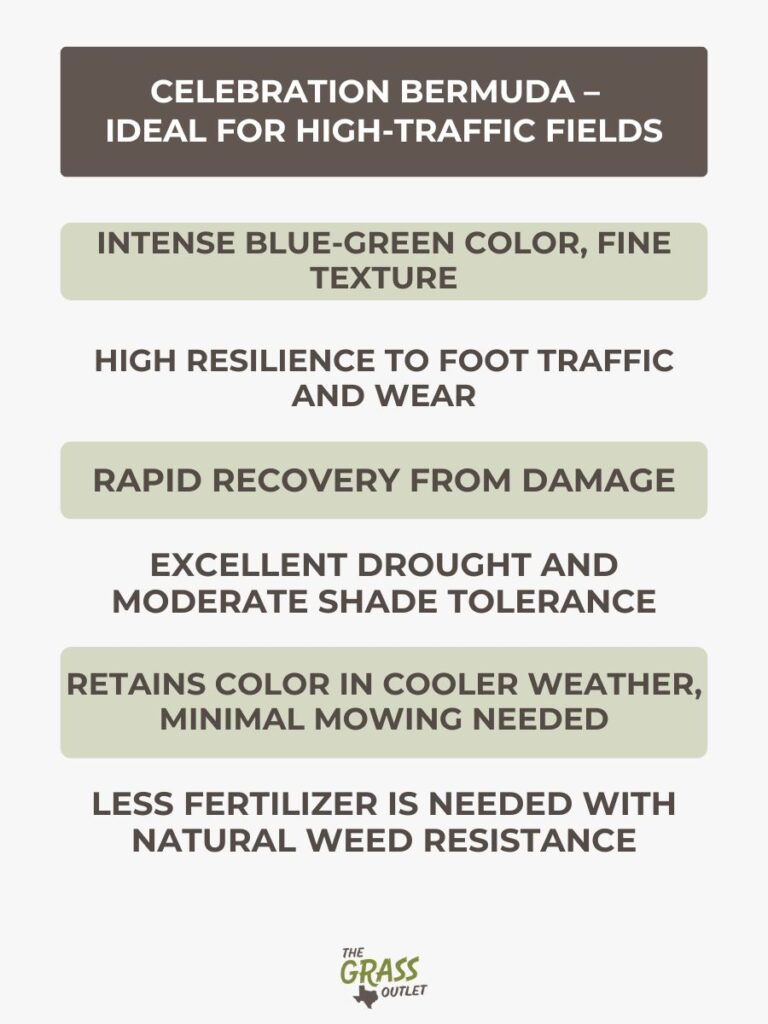
It is distinguished by its intense blue-green color and fine-textured blades. Thanks to its solid rhizomes and roots, Celebration Bermuda offers excellent sod strength, wear resistance, and improved drought tolerance, maintaining its vibrant color throughout the season.
In addition to drought resistance, this Bermuda variety is best grass for shade (as confirmed by various comparative studies of Bermuda grasses). Another key feature is its ability to withstand colder temperatures.
Celebration Bermuda thrives in warm, humid environments but also tolerates cooler weather. Although it is not the most pest-resistant variety (it handles chinch bugs well but is vulnerable to armyworms and sod webworms), it has excellent disease resistance, rarely suffering from issues like gray leaf spots, brown patches, or decline viruses.
During winter, the grass enters dormancy when soil temperatures drop below 13°C, but it retains its signature blue-green color throughout the rest of the year.
Celebration Bermuda requires less fertilization than other Bermuda varieties, reducing the need for long-term lawn care. Another reason to choose this type of grass is that it doesn’t require frequent mowing, as it grows low and has vigorous rhizomes. Lower production costs are achieved through its rapid spread, reproduction via rhizomes, and natural chemical resistance (similar to other Bermuda grasses), making weed control more accessible.
Comparison of Tifway 419 and Celebration Bermuda
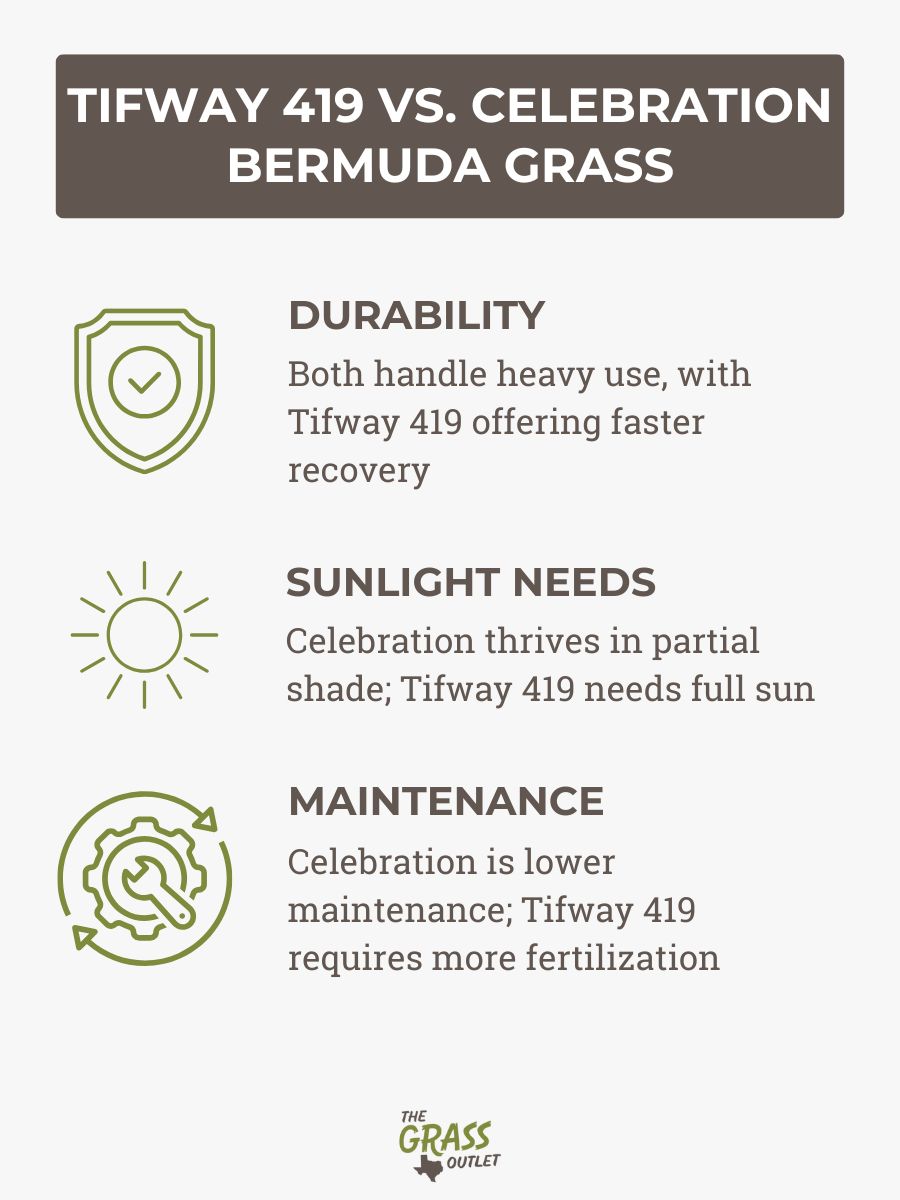
Whether it’s a sports field or a park with heavy foot traffic, Tifway 419’s quick recovery from damage means less downtime for the surface. While Celebration Bermuda is also fast to recover, Tifway 419 generally regenerates slightly faster.
Celebration Bermuda is the better choice for yards or areas that don’t receive direct sunlight throughout the day. It is known for its superior shade tolerance compared to Tifway 419, which requires more direct sunlight to thrive.
Finally, Celebration Bermuda is once again the winner when it comes to maintenance. It requires less fertilization, making Celebration Bermuda grass maintenance a simpler and more hassle-free process. On the other hand, Tifway 419 requires more frequent fertilization and greater attention to maintain its best appearance. If you are prepared for more intensive maintenance, Tifway 419 can deliver exceptional results, but Celebration Bermuda offers a more relaxed approach without sacrificing too much quality.
How to Maintain Soccer Fields with Tifway 419 and Celebration Bermuda
Following a schedule for Tifway 419 turf care will help you establish a routine and create a well-kept, manicured lawn.
What is the mowing schedule for Tifway 419?
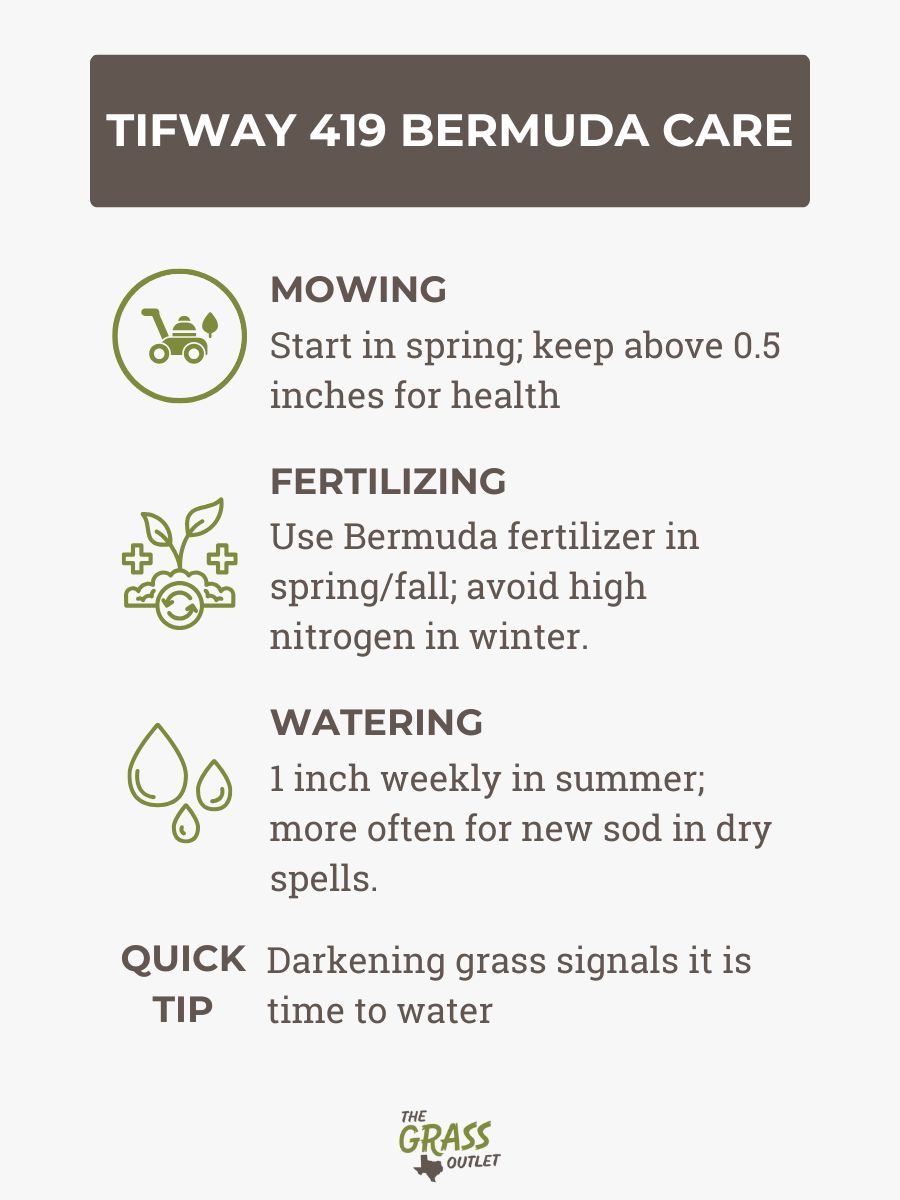
To maintain the plant’s health, it’s best to mow when the grass reaches more than 2 inches but never below 0.5 inches. Leave the grass clippings on the lawn, contributing to natural fertilization and improving soil quality.
Although you may hear recommendations for additional fertilization and “grasscycling,” the clippings will cover a significant part of your lawn’s nutritional needs.
How to fertilize Tifway 419?
Regular fertilization is necessary to keep this grass vibrant and dense. Purchase fertilizer designed for Bermuda lawns and use 1 to 2 kg of nitrogen fertilizer per 100 square meters. It’s recommended to fertilize in the spring and fall, as these are the periods of active growth for the grass.
Avoid applying high-nitrogen fertilizers in the fall and winter, as the grass cannot efficiently use these nutrients during this time.
When applying fertilizer, you can use a spreader for even coverage, avoiding potential burns that can occur when applied to a wet lawn.
How often should you water it?
Watering should be adjusted based on weather conditions and the lawn’s growth stage. During the summer, Tifway 419 requires about 1 inch of water per week. If it’s a newly planted lawn in dry periods, you may need to water it several times daily until it establishes roots.
Proper Tifway 419 Bermuda grass maintenance and watering help prevent the grass from drying out and protect it from pests. It’s always best to water early in the morning before the sun’s heat begins to evaporate the water.
Here’s a tip: a sign that the grass needs watering is when it darkens, indicating that it is stressed due to lack of water.
How to Care for Celebration Bermuda?
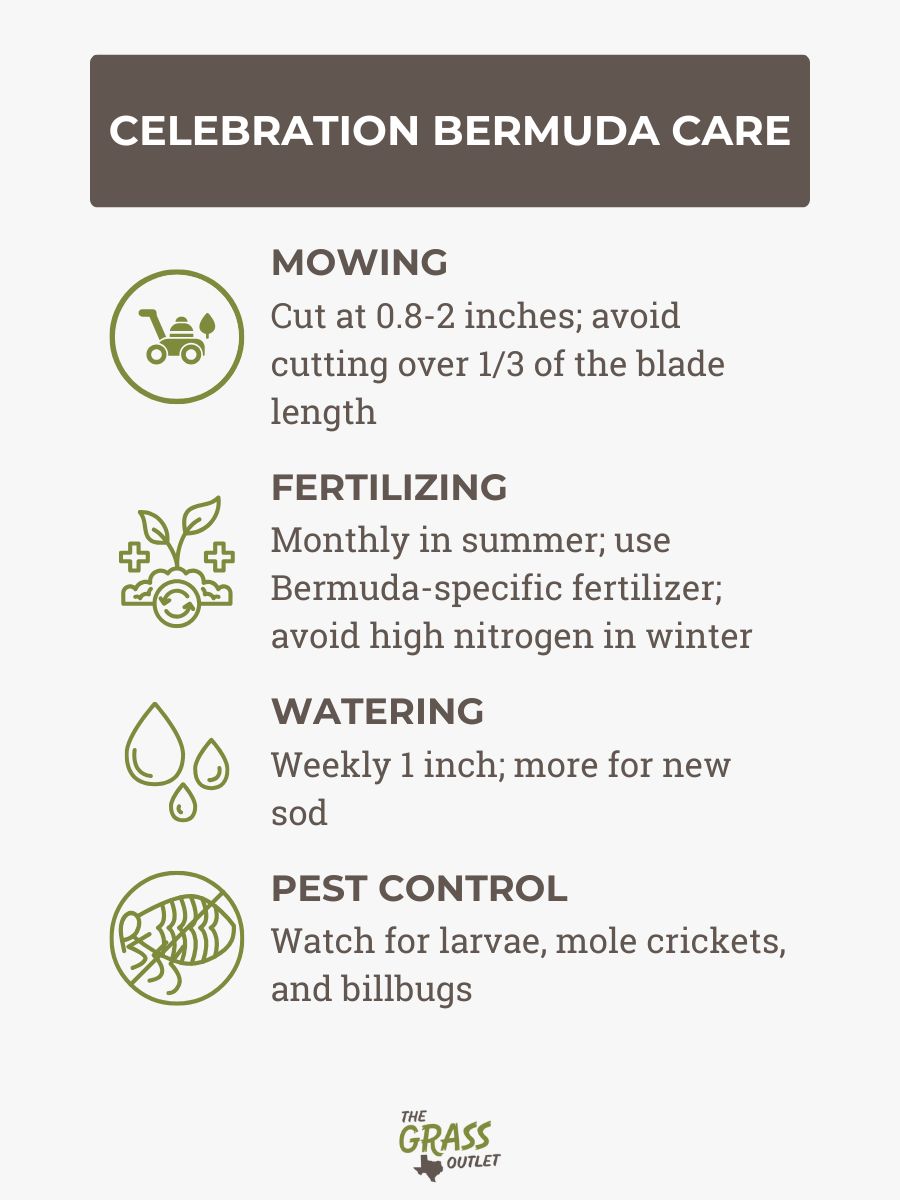
If the grass grows too quickly, wait at least five days between mowings to avoid stressing the plant. Regularly changing the mowing direction can help prevent soil compaction and the formation of tracks on the lawn.
How to water Celebration Bermuda?
One of Celebration Bermuda grass’s main advantages is its drought tolerance. Although it doesn’t need much water, it’s recommended that at least 1 inch of water be provided weekly to keep it healthy and green.
If you’ve recently laid new sod, it will require more frequent watering, perhaps several times a day, to properly root. Also, the best time to water is early in the morning so that the grass can absorb the water before the sun starts evaporating moisture.
Fertilization
Maintaining a lush, green lawn requires regular fertilization, especially during periods of active growth. Fertilizing every month during the summer months, when Bermuda grass grows the fastest, is recommended.
Use a Bermuda-specific fertilizer that contains nitrogen, but avoid high concentrations of nitrogen in colder months, as the grass doesn’t efficiently use these nutrients during that time.
Pest and Insect Control
Pests can cause severe damage to your lawn if not controlled in time. Pay particular attention to insect larvae, nematodes, mole crickets, and billbugs. Treat the lawn with appropriate products as soon as you notice the presence of pests, and be sure to water the lawn after treatment to help the product absorb into the soil.
Conclusion
When forming or renovating soccer fields, choosing the appropriate type of grass is crucial for the field’s longevity, player safety, and quality of play. Tifway 419 Bermuda and Celebration Bermuda are two of the most commonly used varieties due to their wear resistance and fast recovery ability.
Tifway 419 Bermuda stands out for its dense texture, quick recovery, and drought tolerance, making it ideal for professional sports. Celebration Bermuda, known for its shade tolerance and lower fertilization needs, offers excellent durability with lower maintenance requirements.
Although both types of grass provide exceptional performance, the choice between them depends on the specific conditions of the field. Tifway 419 Bermuda is better suited for fields with high-intensity use and rapid recovery, while Celebration Bermuda is a better choice for fields in cooler or shaded areas. Regardless of the choice, regular maintenance, including proper watering, mowing, and fertilization, is essential for preserving the functionality and aesthetics of sports fields.
If you have any questions about this topic, please contact our team at The Grass Outlet; we’ll be happy to assist you.
